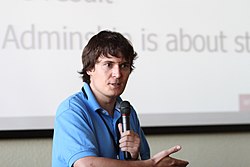FDC's financial muscle kicks in

In a four-day in-person session in San Francisco on October 28–31, the committee analyzed the proposals, considered the staff assessments, and finalized how much funding it would recommend the Board of Trustees allocate to each applicant (see graph below). The volunteers decided to endorse an average of 81% of the funding sought—a total of $8.43M, which went to 11 of the 12 applicants. This leaves $2.71M to be distributed in round 2, for which applications are due in little more than three months' time.
- How the numbers play out
The committee recommended that five chapters and the WMF should be granted the full funding for which they had applied: Wikimedia Germany—which had requested the highest amount among the chapters of $1.79M—and the chapters in Sweden ($341k), Argentina ($146k), Israel ($141k), Hungary ($67k), and the WMF itself ($4.46M). The exception was that fees for the planned Wikimedia Chapters Association were removed from grants where they had been included in application budgets.
The axe came out for at least three chapters' applications, which were severely cut back. WMUK's proposals, amounting to $919k, were met with FDC recommendations of $536k (58% of the requested funds). The committee expressed "significant concerns" over the chapter's current governance challenges and recommended that it focus on resolving that issue before returning to a higher growth rate.
Wikimedia France requested $961k, but this was slashed by more than 90%—close to $900k—due to the FDC's lack of confidence in the organization's current capabilities to execute its proposed annual plan. The committee recommended that WMFR re-evaluate its plan and seek essential bridge funding to carry it over until the second-round recommendations by April 15 and the Board of Trustees' decision by May 15 (both proposed deadlines).
The committee rejected the application for $291k by Wikimedia Australia—currently in the throes of a fractious election campaign. Concerns were expressed over alignment, metrics, and some compliance issues, although the chapter was praised for its "pioneering" GLAM work. The FDC will recommend that the WMF board make an exception to the rules so that both Australia and France may re-apply in round 2 if they wish.
While Switzerland's programs were acknowledged as "laudable", the FDC said the organization might overreach itself on its growth path and recommended only $362K of the $560K requested (64%). Requested budgets by Austria (91%—"costing issues") and the Netherlands (74%—"staffing issues") were also reduced.
The removal of requested contributions by participating chapters to the Wikimedia Chapters Association was justified by the committee by pointing out that the entity is not yet legally in existence, and is still just in a planning stage. The FDC commented that the WCA, once established, might be considered as eligible to apply for FDC funds and that chapters are free to allocate WCA funds as they see fit from their given budgets.
The WMF board is looking at the recommendations, appeals, and comments made on the discussion page. The final decision by the trustees is set to be published on December 15. The second round for this financial year starts on March 1. Wikimedia communities will elect two additional voting FDC members in June.
- Discussion of related issues
The FDC's role in trying to raise standards of governance and accountability in the Wikimedia movement are already becoming evident. The committee has conveyed the gist of its discussions surrounding such issues as:
- the need "to explore in greater depth the kind of growth trajectories that are suitable" for entities of vastly different size and growth stages—in particular, "what kinds of models of staff/volunteer organisations are most appropriate for high-impact work in our movement";
- the fact that some entities during the round were in "situations of transition or crisis, mainly for internal leadership or governance reasons";
- the need "to learn from the different models of leadership and governance, and share both successes and challenges";
- the need "for a movement-wide discussion on 'impact' and 'innovation', and what [the] appropriate metrics, benchmarks and learning systems for these might be", with criticism of the lack of depth and detail in outcome and impact indicators;
- the possible need for more discussion in the movement on chapters' roles in "editor recruitment and membership development";
- how best to support entities that experience challenging situations in executing annual plans; and
- the committee's favourable reaction to proposals that explicitly engaged with "increasing the diversity of the communities they serve, including programs to recruit more women editors".

